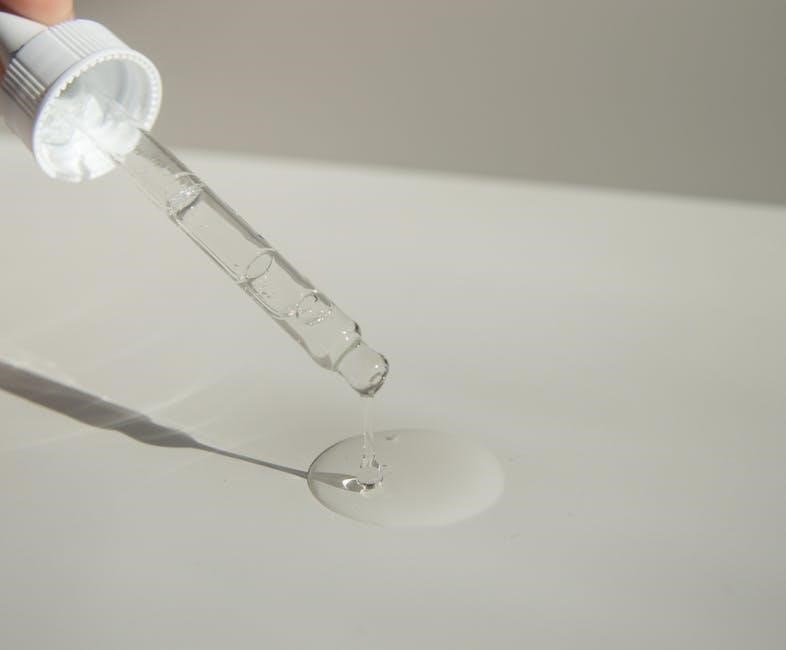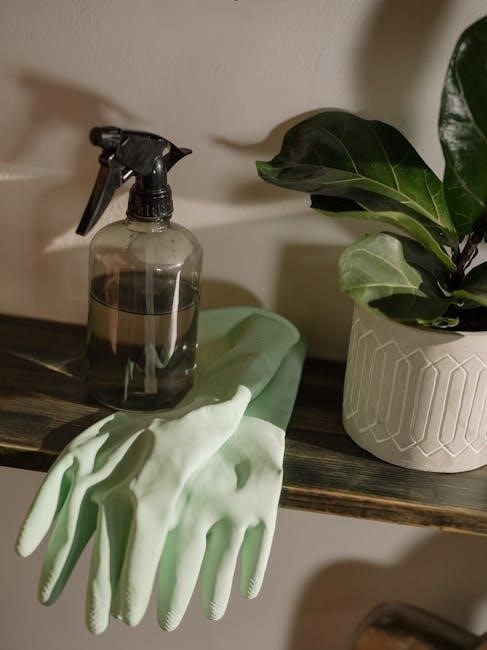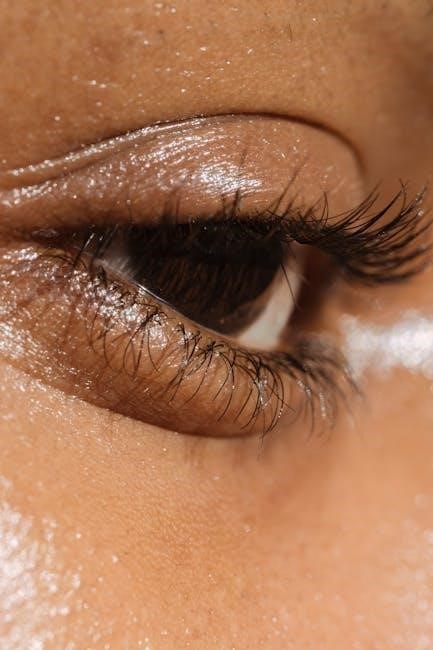Discover how to effectively clean and maintain your dentures with Efferdent․ This guide provides essential steps and tips for proper use, ensuring optimal hygiene and longevity of your dentures․
1․1 What is Efferdent?
Efferdent is a popular denture cleaning tablet designed to effectively remove plaque, food particles, and stains from dentures․ It is specifically formulated to clean and maintain denture hygiene, ensuring a fresh and clean smile․ The tablets contain active ingredients like sodium bicarbonate, which help break down tough stains and odors․ Efferdent is widely used by denture wearers due to its ease of use and effectiveness․ It is suitable for most types of dentures, including full and partial dentures, and is often recommended by dentists and dental hygienists․ By following the instructions, users can achieve a deeper clean and maintain the longevity of their dentures․ Efferdent is a trusted solution for keeping dentures clean, fresh, and in great condition․
1․2 Importance of Following Instructions
Following Efferdent instructions is crucial for achieving optimal cleaning results and maintaining the health of your dentures․ Proper use ensures the removal of plaque, bacteria, and stains, preventing bad odors and infections․ Incorrect usage, such as using too many tablets or soaking for the wrong duration, can damage your dentures or leave harmful residues․ Adhering to the guidelines helps preserve the longevity and appearance of your dentures․ It also ensures your safety, as misuse can lead to irritation or other issues․ By following the instructions carefully, you can enjoy a clean, fresh smile and maintain good oral hygiene․ Consistency and attention to detail are key to getting the most out of Efferdent and keeping your dentures in excellent condition․

Safety Precautions
Always handle Efferdent with care․ Avoid ingesting the tablets or solution, and keep them away from children and pets․ Wear gloves if sensitive, and rinse hands thoroughly after use․
2․1 General Safety Guidelines
When using Efferdent, prioritize safety to ensure effective and risk-free cleaning of your dentures․ Always handle the tablets with dry hands to prevent them from dissolving prematurely․ Avoid ingesting the tablets or the cleaning solution, as they are not meant for consumption․ Keep Efferdent out of reach of children and pets to prevent accidental ingestion․ If you have sensitive skin, consider wearing gloves during the cleaning process․ After handling the tablets or solution, rinse your hands thoroughly with water․ Never use Efferdent for purposes other than cleaning dentures․ Adhere to the recommended dosage and soaking times to maintain safety and effectiveness․ By following these guidelines, you can ensure a safe and successful cleaning experience․
2․2 Special Considerations for Sensitive Individuals
If you have sensitive skin or certain medical conditions, take extra precautions when using Efferdent․ Wear gloves during handling to avoid skin irritation․ Perform a patch test on a small area of your hand before using the product extensively․ Avoid getting the solution in your eyes or mouth, as it may cause discomfort․ Individuals with open sores or gum sensitivity should consult their dentist before use․ If you experience any allergic reactions, discontinue use and seek medical advice․ For those with respiratory issues, avoid inhaling the powder or fumes․ Always rinse your dentures thoroughly after cleaning to remove any residual solution․ By following these guidelines, sensitive individuals can safely and effectively use Efferdent for their denture care needs․

Preparation Steps
Before cleaning, gather all necessary materials and ensure your dentures are free from loose food particles․ This step ensures a smooth and effective cleaning process․
3․1 Gathering Necessary Materials
To start, gather Efferdent tablets, a clean container, and warm water․ You may also need gloves to protect sensitive skin and a soft-bristle brush for scrubbing․ Ensure all items are within reach for a smooth process․ A clean, large enough container is essential to fully submerge your dentures․ Optional items include a denture brush for stubborn stains and a towel for drying․ Having everything prepared beforehand helps avoid interruptions and ensures effective cleaning․ Always use fresh water and avoid using household containers that may harbor bacteria․ This step sets the foundation for a successful cleaning routine․
3․2 Preparing Your Dentures
Before cleaning, rinse your dentures under warm running water to remove loose food particles and debris․ Gently scrub the surface with a soft-bristle toothbrush to eliminate any stubborn residue․ If your dentures use adhesives, remove them completely to ensure proper cleaning․ Check for any broken or loose parts, as these may require professional adjustment before soaking․ Handle your dentures with care to avoid scratching the surface․ Pat them dry with a soft cloth to remove excess moisture, ensuring they are ready for the cleaning solution․ Proper preparation ensures the Efferdent cleaning process is effective and prevents damage to your dentures․

Cleaning Process
Follow these steps for a thorough cleaning: dissolve Efferdent tablets in water, soak your dentures, brush gently, and rinse thoroughly for a clean, fresh result every time․
4․1 Dissolving Efferdent Tablets
Dissolving Efferdent tablets is the first step in the cleaning process․ Fill a bowl or sink with enough warm water to fully submerge your dentures․ Drop one Efferdent tablet into the water for every 32 ounces (approximately 1 liter) of water․ Allow the tablet to dissolve completely, which should take about 1-2 minutes․ Ensure the water is not too hot, as extreme temperatures can damage certain denture materials․ Avoid using more tablets than recommended, as this can create a overly concentrated solution that may harm your dentures․ Once dissolved, the solution will be ready for soaking your dentures․ For best results, use the solution immediately after preparation and avoid letting it sit for extended periods before use․
4․2 Soaking Your Dentures
Once the Efferdent solution is prepared, gently place your dentures into the bowl or sink, ensuring they are completely submerged․ Allow them to soak for 15 minutes to ensure a deep clean․ For tougher stains, you can extend the soaking time to 30 minutes, but avoid exceeding this to prevent damage to certain materials․ During soaking, the effervescent action of Efferdent will help remove plaque, tartar, and stains․ After soaking, remove the dentures from the solution and proceed to the next step․ Always rinse your dentures with fresh water before brushing to remove any residual solution․ Soaking is a crucial step in maintaining the cleanliness and hygiene of your dentures, ensuring they remain fresh and odor-free․
4․3 Brushing the Dentures
After soaking, use a soft-bristle toothbrush or a denture brush to gently scrub all surfaces of your dentures․ Pay special attention to areas where plaque and stains tend to accumulate, such as around the joints and grooves․ Use a non-abrasive toothpaste or denture cleaner to avoid scratching the material․ Brush in gentle circular motions, ensuring thorough coverage․ This step helps remove any remaining debris and stains that the soaking solution may have loosened․ Be careful not to apply too much pressure, as this could damage delicate areas or attachments․ Rinse the brush frequently to avoid re-depositing loosened particles․ Brushing complements the soaking process, ensuring your dentures are clean, fresh, and free from residue․ Always rinse your dentures with fresh water after brushing to remove any remaining toothpaste or debris․
4․4 Rinsing Thoroughly
Rinsing your dentures thoroughly is a crucial step to remove any remaining Efferdent solution and loosened debris․ After soaking and brushing, rinse your dentures under warm running water to ensure all surfaces are clean․ Use fresh, clean water to eliminate any residual solution, as leftover Efferdent could taste unpleasant or cause irritation․ Pay attention to all areas, including the underside and between the teeth, where particles may linger․ For removable dentures, gently shake them under the water to dislodge any trapped debris․ Rinsing thoroughly ensures your dentures are free from cleaning agents and ready for wear․ Avoid using hot water, as it may warp some materials․ Finally, pat your dentures dry with a soft cloth to prevent water spots before storing or wearing them again․

Tips for Effective Cleaning
Maximize your denture hygiene by following these expert tips, ensuring a sparkling clean and fresh smile every time; Learn proper techniques and avoid common mistakes for optimal results․
5․1 Frequency of Cleaning
Consistency is key to maintaining clean and hygienic dentures․ For optimal results, clean your dentures at least twice daily, once in the morning and once before bed․ Soak them in Efferdent solution for the recommended 5 minutes to loosen plaque and stains․ For tougher stains, you can extend the soaking time, but never exceed the maximum duration specified in the instructions․ Regular cleaning prevents the buildup of bacteria and odors, ensuring your dentures remain fresh and comfortable․ Additionally, rinse your dentures with water after meals to remove loose food particles․ By establishing a routine, you can maintain the appearance and functionality of your dentures, while also promoting overall oral health․ Remember, consistent cleaning is essential for long-term satisfaction and confidence in your dentures․
5․2 Avoiding Common Mistakes
To ensure the effectiveness of Efferdent, avoid common mistakes that can compromise results․ Never use hot water, as it may damage the dentures or reduce the solution’s potency․ Avoid scrubbing too aggressively, as this can scratch the denture surface․ Do not soak dentures for longer than recommended, as this can cause discoloration or weaken the material․ Also, never reuse Efferdent solution, as it loses its cleaning effectiveness after the initial soak․ Additionally, avoid using abrasive cleaners or harsh chemicals, which can harm the dentures․ Always rinse thoroughly after soaking and brushing to remove any residual solution․ By adhering to these guidelines, you can maintain the integrity of your dentures and achieve a deeper, more consistent clean with Efferdent․ Proper care ensures your dentures remain in excellent condition for years to come․

Maintaining Efferdent
Properly maintaining Efferdent ensures its effectiveness and longevity․ Store the product in a cool, dry place away from direct sunlight and moisture․ Dispose of used solution responsibly, following local regulations․ Avoid contaminating water sources or recycling used tablets․ Keep Efferdent out of reach of children and pets to prevent accidental ingestion or misuse․ Regularly check the expiration date and replace expired tablets to ensure optimal cleaning performance․ By following these maintenance tips, you can preserve the quality of Efferdent and maintain its efficacy for consistent denture care․
6․1 Storage Tips
Proper storage of Efferdent is crucial to maintain its effectiveness․ Store the tablets in a cool, dry place away from direct sunlight and moisture․ Keep the container tightly sealed after each use to prevent exposure to air and humidity․ Avoid storing Efferdent in bathrooms, as the humid environment can degrade the product․ Ensure the storage location is out of reach of children and pets to prevent accidental ingestion․ Do not store Efferdent near chemicals or cleaning agents, as they may react with the tablets․ If you live in a hot or humid climate, consider storing Efferdent in an airtight container or ziplock bag․ Always check the expiration date before use and replace expired tablets to ensure optimal cleaning performance․ Proper storage helps preserve the potency and longevity of Efferdent, ensuring it remains effective for cleaning your dentures․
6․2 Disposal of Used Solution
After soaking your dentures, dispose of the used Efferdent solution responsibly․ Do not pour the solution down the drain, as it may harm aquatic life․ Instead, neutralize it by mixing with water before disposal․ Check local regulations for specific guidelines on disposing of cleaning solutions․ Ensure the solution is completely dissolved and diluted to prevent environmental impact․ Do not reuse the solution for future cleanings, as its effectiveness diminishes once dissolved․ Proper disposal helps maintain ecological balance and safety․ Always wear gloves when handling the solution and wash your hands thoroughly afterward․ Keep the disposal process out of reach of children and pets to avoid accidental exposure․ By following these steps, you can safely discard the used Efferdent solution while protecting the environment and ensuring a clean, hygienic process for your dentures․

Troubleshooting Common Issues
Address common challenges like residue buildup or stains by adjusting soak time or brushing thoroughly․ If issues persist, consult a dentist for professional advice and solutions․
7․1 If Dentures Are Not Clean
If your dentures remain unclear after cleaning, ensure Efferdent tablets are fully dissolved and the solution reaches the correct temperature․ Soak for the recommended time and gently brush with a soft-bristle brush to remove plaque․ Avoid using hot water, as it may warp dentures․ If residue persists, repeat the cleaning process or consult a dentist for professional cleaning․ Always follow the instructions carefully to achieve optimal results and maintain your dentures’ hygiene․
- Check tablet dissolution before soaking․
- Use a soft-bristle brush for gentle scrubbing․
- Avoid hot water to prevent damage․
7․2 Dealing with Stains or Odors
If your dentures develop stubborn stains or unpleasant odors, ensure you follow the Efferdent cleaning process thoroughly․ Extend the soaking time slightly, but do not exceed the recommended duration․ After soaking, rinse your dentures under running water and gently scrub with a soft-bristle brush․ If stains persist, check the solution temperature and ensure tablets are fully dissolved․ For lingering odors, repeat the cleaning cycle or use a mild denture cleaner․ Avoid using abrasive materials, as they may damage the denture surface․ If the issue remains, consult your dentist for professional cleaning or advice․
- Extend soaking time if needed․
- Avoid using hot water or harsh chemicals․
- Consult a dentist for persistent issues․

Frequently Asked Questions
Find answers to common questions about using Efferdent, ensuring proper care and maintenance of your dentures for optimal hygiene and longevity․
8․1 Can Efferdent Be Used Daily?
Efferdent can be used daily for effective cleaning of dentures․ It is safe and gentle, designed to remove plaque, stains, and odors without damaging your dentures․ For best results, use one tablet per cleaning, dissolving it in warm water as directed․ This daily regimen helps maintain hygiene and freshness, ensuring your dentures remain clean and comfortable․ Always follow the instructions provided to avoid overuse or improper application, which could potentially harm the denture material․ Regular use of Efferdent supports long-term oral health and confidence in wearing your dentures․

8․2 Is Efferdent Safe for All Types of Dentures?
Efferdent is generally safe for most types of dentures, including acrylic, nylon, and porcelain․ However, it is important to ensure compatibility with your specific denture material․ Always check the manufacturer’s guidelines or consult your dentist if you have specialized or delicate dentures․ Efferdent is designed to be gentle and effective, but certain materials may require alternative cleaning solutions․ For standard dentures, Efferdent is a reliable choice for maintaining cleanliness and hygiene․ If unsure, start with a small test soak to verify compatibility․ This ensures your dentures remain in excellent condition while avoiding potential damage․ Always prioritize your dentist’s advice for tailored care․

By following the Efferdent instructions outlined in this guide, you can effectively clean and maintain your dentures, ensuring they remain hygienic and long-lasting․ Regular use of Efferdent helps remove stubborn stains, plaque, and odor-causing bacteria, restoring your dentures to their original appearance․ Remember to always adhere to the safety precautions and cleaning steps to avoid damage and ensure optimal results․ Proper care not only extends the life of your dentures but also promotes good oral hygiene and confidence․ If you have specific concerns or doubts, consulting your dentist is always recommended․ With consistent effort and the right techniques, your dentures will stay clean, comfortable, and functional for years to come․ Take the time to care for your dentures, and they will continue to care for your smile․




























